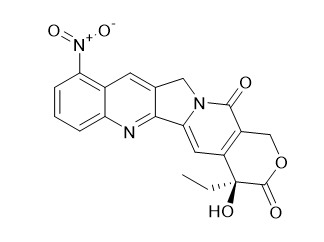Rubitecan
Rubitecan is a novel oral inhibitor of topoisomerase I in the camptothecin class. It shows antitumour activity in patients with refractory pancreatic cancer who have failed prior treatments.
Inquire / Order:
manager@chemfaces.com
Technical Inquiries:
service@chemfaces.com
Tel:
+86-27-84237783
Fax:
+86-27-84254680
Address:
1 Building, No. 83, CheCheng Rd., Wuhan Economic and Technological Development Zone, Wuhan, Hubei 430056, PRC
Providing storage is as stated on the product vial and the vial is kept tightly sealed, the product can be stored for up to
24 months(2-8C).
Wherever possible, you should prepare and use solutions on the same day. However, if you need to make up stock solutions in advance, we recommend that you store the solution as aliquots in tightly sealed vials at -20C. Generally, these will be useable for up to two weeks. Before use, and prior to opening the vial we recommend that you allow your product to equilibrate to room temperature for at least 1 hour.
Need more advice on solubility, usage and handling? Please email to: service@chemfaces.com
The packaging of the product may have turned upside down during transportation, resulting in the natural compounds adhering to the neck or cap of the vial. take the vial out of its packaging and gently shake to let the compounds fall to the bottom of the vial. for liquid products, centrifuge at 200-500 RPM to gather the liquid at the bottom of the vial. try to avoid loss or contamination during handling.
Phytomedicine.2024, 122:155065.
Jour. of Stored Pro & Postharvest Res.2016, 7(3):32-36
Enzyme Microb Technol.2019, 122:64-73
Antioxidants (Basel).2023, 13(1):12.
ACS Synth Biol.2020, 9(9):2282-2290.
Molecules.2023, 28(10):4062.
Natural Product Sciences2023, 29(4):276-280.
J Appl Biol Chem2023, 66:455−461
mBio.2020, 11(3):e00686-20.
Molecules.2022, 27(19):6651.
Related and Featured Products
Journal of Clinical Oncology, 2005, 23(16):349S.
Patients rescued by crossover to rubitecan in phase III study of rubitecan capsules versus 5-FU in pancreatic cancer.[Reference:
WebLink]
Rubitecan (Orathecin) is a novel oral inhibitor of topoisomerase I in the camptothecin class.
METHODS AND RESULTS:
A Phase III randomized multinational open-label study of Rubitecan versus 5-FU in pancreatic cancer patients who had progressive disease following gemcitabine treatment was undertaken. The primary endpoint was overall survival. Key patient eligibility criteria included pathologic diagnosis of pancreatic cancer, progressive disease on gemcitabine, Karnofsky Performance Status of 50 and life expectancy of 2 months. Rubitecan was administered at 1.5 mg/morally 5 days/week. 5-FU was administered at 600 mg/mintravenously once weekly. Patients who progressed or experienced intolerable toxicity could crossover to the alternate treatment arm. 93 of 224 (41%) 5-FU patients crossed over to Rubitecan rescue. Only 1 of 224 Rubitecan patients crossed over to 5-FU. Main reasons for rescue with Rubitecan were radiologic (75%) and symptomatic (12%) progression on 5-FU. Median survival from randomized baseline was longer for patients who crossed over from 5-FU to Rubitecan rescue compared to patients who did not crossover from 5-FU (184 versus 66 days). 35 of 93 (38%) patients had follow-up scans after the initiation of Rubitecan rescue and were evaluable for tumor response assessment. 14 of 35 (40%) patients achieved tumor growth control (4 had objective tumor responses and 10 had disease stabilization). The most common Grade 3/4 adverse events with Rubitecan were myelotoxicity (34%) and gastrointestinal (14%). All deaths on study were primarily related to disease progression.
CONCLUSIONS:
These results support that patients with refractory/resistant pancreatic cancer, who have progressed on gemcitabine and 5-FU, can derive benefit from Rubitecan, an oral medication that can be taken at home with manageable toxicity.
Clin Colorectal Cancer. 2004 Sep;4(3):163-80.
Topoisomerase I inhibitors in the treatment of gastrointestinal cancer: from intravenous to oral administration.[Pubmed:
15377400]
This article reviews the current status of the topoisomerase I (top I) inhibitors in the treatment of gastrointestinal (GI) malignancies.
METHODS AND RESULTS:
We focus on oral drug administration, the mode of administration that is generally preferred by patients with cancer. However, the great majority of the studies have been performed with intravenous (I.V.) administration. The most extensively investigated GI malignancy in phase I/II studies is colorectal cancer (CRC), for which I.V. irinotecan is currently approved in the United States and Europe. We discuss the activity and efficacy of irinotecan as a single agent in CRC and in combination regimens. Also, results obtained with monotherapy and in combination treatment in other GI malignancies such as esophageal, gastric, and pancreatic cancer are discussed. Few phase I studies have been performed with oral irinotecan and its clinical activity has not yet been fully determined. Several top I inhibitors are discussed, including topotecan, 9-aminocamptothecin, Rubitecan, exatecan, and lurtotecan. None of these agents, given orally or intravenously, have shown activity in CRC similar to that of I.V. irinotecan. However, several agents show promising results in other GI malignancies, eg, Rubitecan and exatecan in pancreatic cancer. A complicating factor in the oral administration of the top I inhibitors is the often encountered low and variable oral bioavailability. This can partly be explained by the high affinity for the drug efflux pumps BCRP (ABCG2) and P-glycoprotein, which are highly expressed in the epithelial apical membrane of the GI tract.
CONCLUSIONS:
A novel approach to improve the oral bioavailability of the top I inhibitors by temporary blockade of the drug transporter BCRP is described.



